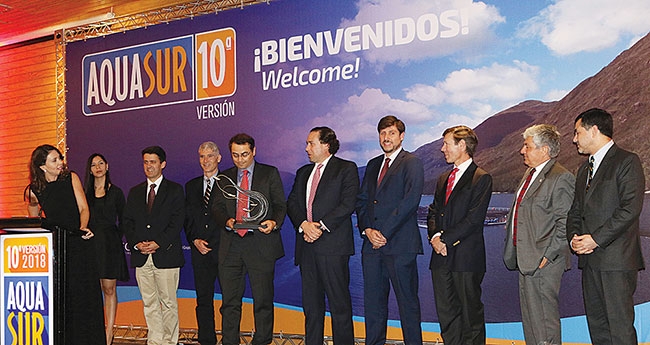
News & Views
Pincoy Project rewarded for combatting antibiotics in aquaculture
Chile’s Pincoy Project initiative has been recognized for its contribution to the environment at international aquaculture event AquaSur 2018.
December 11, 2018 By Hatchery International Staff
 Representatives from the seven companies that comprise the Pincoy Project being recognized in Chile. Chile’s Pincoy Project initiative
Representatives from the seven companies that comprise the Pincoy Project being recognized in Chile. Chile’s Pincoy Project initiativeThe project, named after Pincoy, a water spirit in Chilean mythology, is aimed at reducing the use of antibiotics in the Chilean salmon industry. It was initiated in 2016 through a collaborative effort between Skretting, Blumar Seafoods, Cermaq Chile, Ventisqueros, Pharmaq, AquaGen/Blue Genomics, and Centrovet Laboratory.
Representatives from each of the seven companies were recognized at a dinner in October in Puerto Varas, Chile.
“The project delivers a collaborative and holistic approach to combat the use of antibiotics, through an initiative that defines high standards of animal welfare and operational excellence throughout the value chain, considering selective breeding, high quality hatchery diets, smolt selection, vaccines and the implementation of best-practice protocols and monitoring throughout the production cycle, as well as the use of functional diets, to contribute to the sustainable growth of aquaculture and improve Chile’s perception as a sustainable fish producer,” says Ronald Barlow, general manager of Skretting Chile.
The World Health Organisation (WHO) cites antimicrobial resistance (AMR) as an increasingly serious threat to global public health, and it has been urging the implementation of coordinated action plans across all levels of society to slow its acceleration. With the knowledge that the overuse of antibiotics in animal production contributes to AMR, Skretting sees the Pincoy Project as an active contribution to finding solutions for this challenge.
“Through the Pincoy Project, Skretting has provided conclusive evidence that a collaborative and proactive approach can improve animal welfare while improving productivity,” Barlow says.
The Pincoy Project will move towards version 2.0 that seeks to continue investigating the possibilities around the reduction of antibiotics, delivering a different and innovative perspective in the search for sanitary and healthy solutions for fish in the Chilean aquaculture sector.
Print this page





